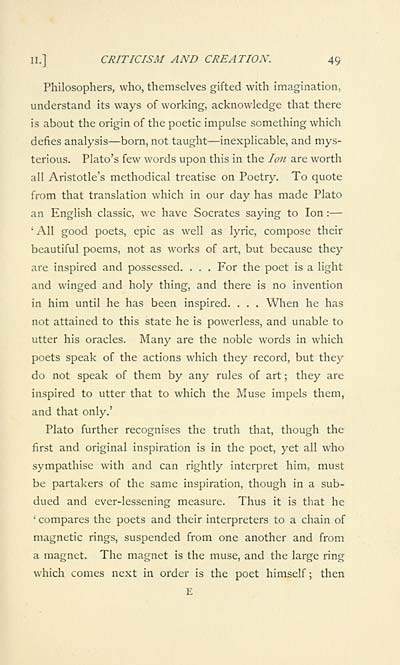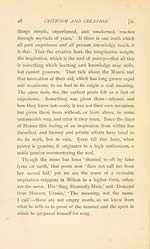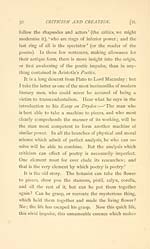Download files
Complete book:
Individual page:
Thumbnail gallery: Grid view | List view

II.] CRITICISM AND CREATION. 49
Philosophers, who, themselves gifted with imagination,
understand its ways of working, acknowledge that there
is about the origin of the poetic impulse something which
defies analysis — born, not taught — inexplicable, and mys-
terious. Plato's few words upon this in the Ion are worth
all Aristotle's methodical treatise on Poetry. To quote
from that translation which in our day has made Plato
an English classic, we have Socrates saying to Ion : —
'All good poets, epic as well as lyric, compose their
beautiful poems, not as works of art, but because they
are inspired and possessed. . . . For the poet is a light
and winged and holy thing, and there is no invention
in him until he has been inspired, . . . When he has
not attained to this state he is powerless, and unable to
utter his oracles. Many are the noble words in which
poets speak of the actions which they record, but they
do not speak of them by any rules of art ; they are
inspired to utter that to which the Muse impels them,
and that only.'
Plato further recognises the truth that, though the
first and original inspiration is in the poet, yet all who
sympathise with and can rightly interpret him, must
be partakers of the same inspiration, though in a sub-
dued and ever-lessening measure. Thus it is that he
' compares the poets and their interpreters to a chain of
magnetic rings, suspended from one another and from
a magnet. The magnet is the muse, and the large ring
which comes next in order is the poet himself; then
E
Philosophers, who, themselves gifted with imagination,
understand its ways of working, acknowledge that there
is about the origin of the poetic impulse something which
defies analysis — born, not taught — inexplicable, and mys-
terious. Plato's few words upon this in the Ion are worth
all Aristotle's methodical treatise on Poetry. To quote
from that translation which in our day has made Plato
an English classic, we have Socrates saying to Ion : —
'All good poets, epic as well as lyric, compose their
beautiful poems, not as works of art, but because they
are inspired and possessed. . . . For the poet is a light
and winged and holy thing, and there is no invention
in him until he has been inspired, . . . When he has
not attained to this state he is powerless, and unable to
utter his oracles. Many are the noble words in which
poets speak of the actions which they record, but they
do not speak of them by any rules of art ; they are
inspired to utter that to which the Muse impels them,
and that only.'
Plato further recognises the truth that, though the
first and original inspiration is in the poet, yet all who
sympathise with and can rightly interpret him, must
be partakers of the same inspiration, though in a sub-
dued and ever-lessening measure. Thus it is that he
' compares the poets and their interpreters to a chain of
magnetic rings, suspended from one another and from
a magnet. The magnet is the muse, and the large ring
which comes next in order is the poet himself; then
E
Set display mode to: Large image | Transcription
Images and transcriptions on this page, including medium image downloads, may be used under the Creative Commons Attribution 4.0 International Licence unless otherwise stated. ![]()
| Early Gaelic Book Collections > Ossian Collection > Aspects of poetry > (65) |
|---|
| Permanent URL | https://digital.nls.uk/78386052 |
|---|
| Description | Selected books from the Ossian Collection of 327 volumes, originally assembled by J. Norman Methven of Perth. Different editions and translations of James MacPherson's epic poem 'Ossian', some with a map of the 'Kingdom of Connor'. Also secondary material relating to Ossianic poetry and the Ossian controversy. |
|---|
| Description | Selected items from five 'Special and Named Printed Collections'. Includes books in Gaelic and other Celtic languages, works about the Gaels, their languages, literature, culture and history. |
|---|

